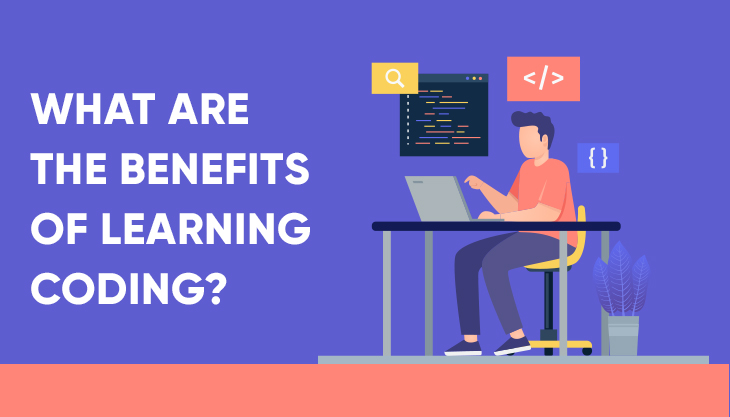There has long been a preconception that coding is just for the brightest of minds—those who really can type 100 words a minute while staring at an unending scrolling screen of text. Many people also used to think of coding as an unusual hobby for nerds who tinkered with pcs in their garages. However, coding has evolved from a pastime to a necessary employment skill in recent years. What's better for hobbyists? Employers have demonstrated a readiness to pay a higher price for people who can code and programme.
Given this information, you may be questioning if coding is something that you must pursue. However, there are still many unanswered questions. What is the average time it takes to learn to code? What are the advantages of knowing how to code?
We enlisted the expertise of experts from a number of fields to answer your questions and provide their perspectives on the value of education and the benefits of coding.
Coding and programming careers have a great earning potential.
The potential earnings for programming and coding experts is one of the greatest and most evident draws of learning to code. For a range of occupations, the Bureau of Labour Statistics (BLS) keeps track of wage and other essential workforce data.
Take a look at the median annual pay data from the Bureau of Labour Statistics (BLS) for these coding and programming-related jobs in 2019:
- $73,760 for web developers
- $83,510 for computer and information systems administrators
- $86,550 for computer programmers
- $93,750 for database admins
- $107,510 for software developers
Coding and Coding Professionals are much seeked.
When contrasted to the national average of 5% growth, it's clear that a few occupations are exceeding the majority of others. Computer programmers are an exception in this group, but others believe that these estimates are impacted by computer programming talents merging into other in-demand tech occupations.
While the role remains important, more and more composite positions are being brought into the workforce. As a result, there are fewer employment openings for "computer programmers," and more chances to combine programming talents with other career titles.
The following are the latest BLS employment growth predictions for the same coding and coding professions:
- 13 percent are web developers.
- Administrators of computer networks and systems: 5%
- Computer programmers make up 7% of the workforce.
- 9% of database administrators are database administrators.
- Software developers make around 21% of the workforce.
The ability to code provides a fresh perspective on problem-solving:
"Learning to code has the unintended consequence of educating you how to think," explains Nuvro CEO Adrian Degus. He goes on to say that he's always been more prone to emotionally solving situations. His coding skills, on the other hand, have taught him how to approach problems methodically.
"Knowing logic at a deep level has tenfold improved my problem-solving ability," he adds.
In perhaps the most basic form, coding entails giving a machine a task to complete depending on the logical principles you've established. When you break down very complex jobs, they become a series of smaller procedures. This rigorous and reasoning mind - set might be useful for solving issues that aren't related to coding.
Learning to code will help you have a better understanding of technology and increase your tech literacy.
Programming abilities will give you a high degree of tech literacy, which will open up new options in your career or company, regardless of what job you end up with. You'll be able to comprehend how things progress technologically and how quickly things can change in the realm of technology. Understanding how computers work and how apps are made, as well as coding expertise (or coding literacy), can benefit in a variety of ways. It can assist you in grasping things more quickly, becoming a faster learner, and becoming more digitally competent. Training to code at an early age will offer you a significant advantage over your peers and put you up for a bright career.
Everyone should be introduced to coding at some time in their lives in order to become familiar with the world surrounding us, which is full of digital sensors and technology tech products. This exposure isn't just for computers and programming; it can also help with logical thinking and problem-solving in steps.
Learning to code can be a pleasant way for families to bond:
How often would you get the chance to teach your children something useful and new? Parents and their school-aged children have the opportunity to learn the essentials of programming and coding together.
Working with youth-friendly materials like Scratch, which introduces both you and your child to programming fundamentals and systematic reasoning, is a fantastic way to test the boundaries of learning to code. As you progress to more complicated languages and applications, you will benefit from this foundational knowledge.
Coding Improves Logical Rationalisation and Reasoning Skills:
Learn to code to become a rational thinker, improve your critical thinking abilities, and learn to take a systematic approach to problems. In most circumstances, computer coding entails using linear thinking, organisation, and logic.
To programme a computer, you must be able to communicate an organised set of instructions and methodically break down difficulties. As a result, coding teaches and motivates children to see the world in new ways.
Techasoft Foundation, located in Bengaluru, India, is one of the top and leading IT firms in the world who’ve ventured into IT enabled education services in addition to their competence in Developing Software, Website Development & Development, Digital Marketing, and other areas. It has also been involved in a variety of national interest sectors since its inception, including academia, developing skills, entrepreneurship, proactive wellness, and so on.

